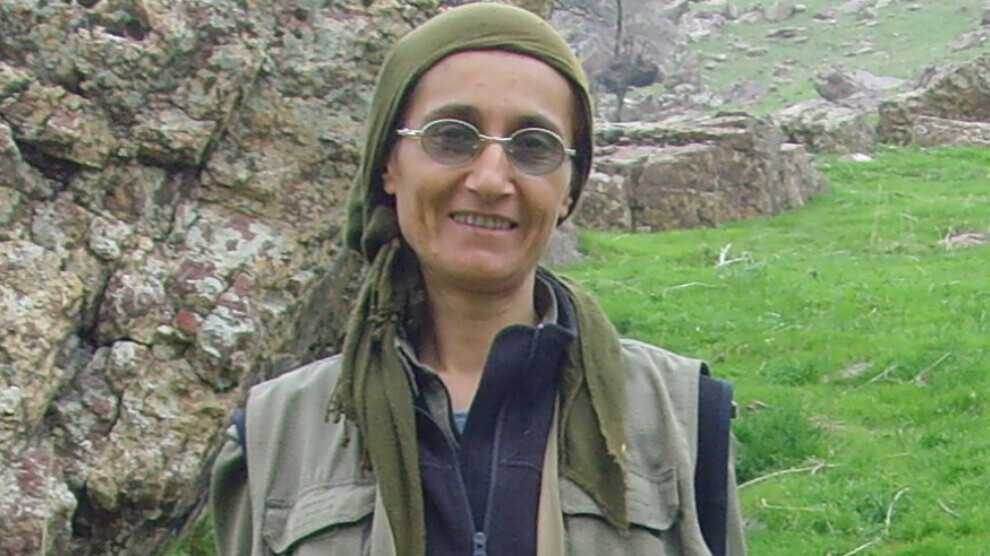PKK: Raperîn Amed fell as a martyr
The PKK announced that Delal Azizoğlu (Raperîn Amed), one of the leading figures of the Women's Freedom Movement, fell as a martyr on 17 June 2022 in the Medya Defense Areas.
The PKK announced that Delal Azizoğlu (Raperîn Amed), one of the leading figures of the Women's Freedom Movement, fell as a martyr on 17 June 2022 in the Medya Defense Areas.

In a written statement, the PKK Solidarity with Families of Martyrs Committee, said that Raperîn Amed (Delal Azizoğlu), one of the leading figures of the Kurdish Women's Movement, fell as a martyr. While continuing to serve with great devotion, she joined the caravan of immortals as a result of the air attack carried out by the invading Turkish state.
The committee's statement said: “In Kurdistan, which has witnessed a great heroic struggle for half a century, we are greeted every day with the legacy of resistance left by our many heroic martyrs. Martyrs are the strength of a people, those that keep the people alive, their source of life and their world of meaning.
Comrade Raperîn Amed, one of the leading figures of the Kurdistan Women's Freedom Movement, was born in 1969 in a patriotic family in the Farqîn district of Amed, the stronghold of the resistance. Comrade Raperîn, who moved to Ankara with her family in 1977, studied primary, secondary and high school in Ankara. During the long years that she stayed in Ankara, she met with the national contradictions stemming from the Kurdish identity in her secondary school years. The approaches and treatments she faced, especially because of her name being Delal, deepened her contradictions and led to the development of her searches on the basis of identity awareness. On this basis, she went to Amed, the heart of Kurdistan, and refused to study in the schools of the system, despite her family's insistence that she continue to study. She succeeded in making her family accept her stubborn personality, she made her own decisions, defended the truths she believed in, and had a free spirit.”
The statement continued: “Comrade Raperîn, who moved with the Leader [Abdullah Ocalan] in 1996, had the opportunity to learn and get to know the PKK struggle, as she puts it, "from the architect of the PKK". Comrade Raperîn, who stayed with the Leader between 1996-1998, deepened her identity and consciousness of women with the training she received from the Leader. She found the answers to the contradictions she experienced about female identity at an early age and her search for freedom in the ideology and philosophy of the Leader. She participated in people's work in Aleppo in order to spread this ideological and philosophical deepening in the practical field and to provide a strong public and women's leadership. After that, she marched as a strong militant and pioneer of the women's freedom line and struggle.”
Return to the mountains in 2005
The statement said that “comrade Raperîn , who stayed in Europe between 2000-2005, took an active part in the work done there. She participated in the rebuilding efforts of the PKK in Europe. In 2005, she returned to the mountains, where she saw the education she received during the rebuilding of the PKK and PAJK as a process of rebuilding herself. After this training, she took part in Science Enlightenment and Political Committee studies. She remained in Rojhilat in 2006-2007, and in 2008, when the PÇDK was organized for women's work, she worked actively on these there for more than a year.
From Rojava to Shengal
In 2011, she was elected to the Kongra-Gel Presidency Council. She is particularly interested in the work of commune organizations, and she worked in many areas from Rojava to Shengal, where she has made great efforts for the construction of a democratic nation paradigm. Comrade Raperîn worked a lot to make the paradigm vital in every environment, in every speech, in every word she said, with her great belief in the Democratic Nation paradigm. She has always considered women's and youth work as her top priority. She waged a great struggle against the genocide and the attacks on the Leader. She became a keen fighter for the spread and vitalization of the Democratic Nation paradigm.
She left a mark in all four parts of Kurdistan and in every area where the people of Kurdistan lived, because of her struggle, participation, effort, modesty and pioneering stance. At the same time, she fought at the forefront against the dominant mentality, backward-traditional understanding and stances everywhere. She took the line struggle as a basis without hesitation and without ever getting into individual concerns.”